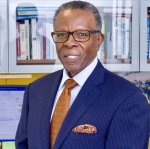 Herb Tillery
Herb Tillery
College Success Foundation
“Nonprofit leaders should not think of themselves as just nonprofit leaders, but more of a business leader, then act accordingly.”
Tell us about your leadership style and how this contributes to your organization’s success.
I do not see myself as a singularly styled leader. I view myself as a cross section of several styles, as defined by the academic community. My leadership style changes depending on the type of organization I am leading or the current dynamics inside the organization at a given time in the life cycle of that organization. Since being at the College Success Foundation over the past 10 plus years, my style has commonly crossed the realms of strategic leadership, transformational leadership, team leadership and visionary leadership. As the first executive director, it was my duty to define the mission, determine the outcomes we wanted to achieve, set the vision for getting there, and hire the right folks who would buy into the vision to ensure we achieved the stated outcomes and accomplish our mission, hence a heavy reliance on being a visionary leader. As time moved on, we had the need to ensure we were best in class in delivering the services to the students we are serving in an effort to achieve the outcomes we had set for ourselves. During that time, I tended to exercise more of a strategic leadership style.
Throughout my time as executive director, I have had to continually team build because our success is dependent on how well we all work together, how well we all are able to critically analyze our results, then collectively develop strategies to improve our outcomes, hence my style was heavily focused on team leadership. Over the last three years, we have gone through a major third party evaluation that identified our successes, yet provided areas of improvement that will assist in significantly improving the outcomes we want to achieve for our students. This led to development of an enhanced program, which led to the identification of skills needed to achieve the increased outcomes, which led to the need for a major training effort for our current staff, and the seamless implementation of the newly enhanced program without any negative impact on the students we were serving. During this effort, I had to lean heavily a transformational leadership style. We have already seen that the implementation of this enhanced program is leading to even greater outcomes for our students and impact on the community we serve.
What advice would you offer for other nonprofit leaders?
My advice to nonprofit leaders is to not think of themselves as just a nonprofit leader, but more of a business leader, then act accordingly. Many nonprofit leaders have become leaders of their nonprofit due to their technical expertise in the field of focus of the nonprofit. In doing so, they may not have the requisite skills to manage and lead the nonprofit as a business that has operational functions that need to be tended to in order to sustain the life of the nonprofit.
Functions such as budgeting, back office oversight, fundraising, staff training and development, strategy development, branding and publicity, and collaboration with like-minded organizations in an effort to collectively improve outcomes for the community being served. Although the organization provides needed serves within the community they serve, they may fail because not enough attention was given to the management, strategy development and stewardship of functions that leaders of high performance organizations tend to.
What does this award mean for you and your organization?
The College Success Foundation – DC prides itself in being a learning organization. A part of our organizational culture is for each member of our team to continually seek self-improvement through researching best practices in our field of college access and success, sharing our findings with other team members during our regularly scheduled team meetings and staff meetings, attending and/or presenting professional development workshops at national conferences associated with our field, such as the National College Access Network (NCAN), of which I am a member of the board. Our overall professional development philosophy doesn’t just apply to our team members who are doing college access and success advisement, but includes self-improvement for our IT Support Analyst, our development team, and our support assistants.
This award would significantly contribute to our efforts to keep our team members informed of advancements taking place in the college access and success space by attending conferences and participating in programs that inform our work of providing support to low income, first generation college students, allowing them to be innovative in our approach to service delivery. I too continually seek professional development and coaching opportunities in my efforts to improve my nonprofit leadership skills and provide the kind of innovation that will allow us to be best in class, more importantly, improve the outcomes for the students we serve.
Learn more about College Success Foundation